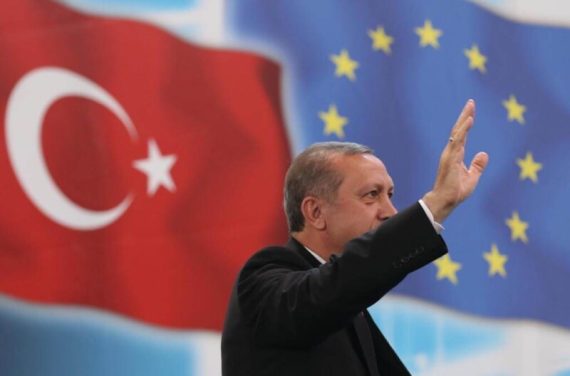W
estern analysts acknowledge that Turkey’s May 14 elections are among the most important elections of 2023. Europeans follow the polls almost as eagerly as Turks because for the first time in two decades, there is hope in Europe that the Erdoğan administration can change. Many European- and U.S.-centered media outlets publish opinion pieces on Turkish elections on a daily basis. Roughly half of these articles predict that President Erdoğan will win the election again, while the other half speculate that Erdoğan will not accept the election results, if he loses.
The reason why European actors closely follow Turkey’s elections and are in favor of a government change is that under President Erdoğan’s leadership, Turkey has become an international actor capable of establishing a sphere of influence in the Middle East, the Balkans, the Turkic world, South Asia, and many countries in Africa.
President Erdoğan has taken Turkey out of the Western political orbit and turned it into a more independent player, adopting more autonomous and indigenous policies. This approach finds a response beyond Turkey’s borders. European political circles are equally disturbed by Turkey’s influence on Muslim minorities in Europe, including those of Turkish origin, which have become intensely sympathetic to Turkey under Erdoğan.
Europe’s Expectations and its “ideal” Turkey
Europe’s main expectation from Turkey’s May 14 elections is to see a weaker political profile come to power and for the country to follow a more inward-looking and less assertive regional foreign policy. There appears no plan in sight for Europe to revive membership negotiations with Turkey for the European Union. Even if Kemal Kılıçdaroğlu and the Nation Alliance win the elections, there is no easy and fresh start with Turkey, which will continue to be pushed back. In fact, Kılıçdaroğlu’s promise to “lift visas to Europe” if elected was already denied by German officials.
A vision of a Turkey which follows EU foreign policy and integrates into the European economy as much as EU member states allow, but that remains outside of the union, is the ideal relationship between the EU and Turkey for European politicians. Against this backdrop, President Erdoğan’s vision of the “Axis of Turkey” with an expanded strategic autonomy and a balanced foreign policy is at odds with the European vision of Turkey.
European experts do not shy away from saying that Kılıçdaroğlu’s Nation Alliance would be more in line with their “ideal” Turkey. At the same time, the opposition’s possible election victory also worries them. As there is no plan in Europe’s short-term agenda to initiate a new phase in its relations with Turkey, it is easier and more convenient to maintain the status quo if Erdoğan remains in power. Europe seems to have no road map for how it will redefine relations with Turkey if the opposition wins. Although some European politicians are giving Turkish opposition figures pats on the back, this may not have immediate positive repercussions.
European Media’s Approach to Turkey
Dreaming of a Turkey without Erdoğan, many European think tanks, politicians, and media outlets have taken a firm stance on Turkey’s May 14 elections. Even though, they cannot foresee what the consequences of a possible government change would be for the European Union, they are aware that their capacity to influence Turkish politics will be extremely limited if Erdoğan is reelected. As a result, they have persistently avoided taking any political steps that could set a constructive agenda with Turkey, as they believe that revitalizing Turkey-EU relations could strengthen Erdoğan’s hand.
The EU’s short-term foreign policy expectations from Turkey are the following: Sweden’s admission to NATO, and Turkey’s abandoning a balanced position in the Ukraine War and taking a clear stance against Russia. However, European political actors are uncertain about the Turkish opposition’s possible approach to the migration issue and view the opposition’s discourse on the deportation of Syrian refugees in Turkey with hesitation. Europe is not prepared for a wave of migration through Turkey. That is why, there is also a narrow group of politicians who advocate in favor of the continuation of the current administration in Turkey. While there are opportunities for mutually beneficial cooperation between Turkey and the EU in many areas such as energy, agriculture, transportation, industry, and technology, there is no political will to mobilize this potential.
While European analysts recognize that the Nation Alliance is an ideologically fragmented and fragile political entity, they agree that it is a preferable alternative to a strong Erdoğan administration. They believe that they can get along more easily with some members of the Nation Alliance. Moreover, possible cracks in the alliance can create a framework in which they can exert their own influence. In fact, many articles in German, French, and British media outlets argue that that the Turkish economy will decline further if the current government remains in power.
Nobody knows whether there will be a renewed mobilization in potential areas of cooperation, if Kılıçdaroğlu becomes Turkey’s new president. Some even suggest that if Erdoğan is reelected, Turkey-EU relations could regain a positive momentum through a gradual progress based on mutual interests. Moreover, the Erdoğan administration’s expectations from the EU are more modest than those of the opposition.
The Two Portrayals of Turkey in Europe
There are two different portrayals of Turkey’s May 14 elections being presented to Europeans. European politicians and journalists often interact with Turkish citizens living in Europe who are white-collar migrants, media journalists, and members of academic elites. These individuals are largely politically pro-opposition, are ideologically motivated, or adhere to certain ethnocentric factions. Consequently, European media understand the developments in Turkey through the biased perspective of such actors, who publish partisan articles in media outlets on contemporary Turkish politics.
Turkey is also portrayed by a secularist European elite, whose perspective largely overlaps with the Turkish opposition, depicting Turkish politics one-sidedly. Articles produced by prejudiced actors are then translated into Turkish, generating another impact layer in Turkey. This offshore opposition, supported by Europe, aims to influence Turkish politics from abroad, and forms a biased political enclave that despises a conservative and nationalist government with Islamic moral codes in Turkey represented by a strong leader personified in Erdoğan. Having invested all their hope for change in the Nation Alliance, this enclave has the potential to influence its elite interlocutors in Europe.
However, citizens of Turkish origin across Europe draw a completely different picture. Almost two-thirds of those of Turkish origin in Europe voted for President Erdoğan in the 2018 presidential elections. This rate is on average 10 points higher than the support Erdoğan received in Turkey. In the 2023 presidential and parliamentary elections, the picture is not expected to change dramatically. There is a silent majority of people of Turkish origin in Europe supporting Erdoğan. European politicians and bureaucrats are aware of this silent majority, whose views are not reflected or represented in the press or in academic circles.
Recommended
Ironically, some European politicians explain the support for Erdoğan and the AK Party in Europe not as an outcome of Europe’s exclusionary practices, but as a failure of their assimilation policies or what they call “integration.” The silent majority’s strong support for Erdoğan remains constantly unreported in the mainstream media, and media, reinforcing the concern about Erdoğan’s popularity in elite circles.
Europeans who do not fully grasp Turkish politics and Turkish citizens’ voting behavior are more inclined to accept the narrative that the elections are being rigged. If European media outlets and analysts would have evaluated the field fairly and objectively, lifting their ideological blinders on Turkish politics, they could have a better grasp of the real picture.
The choice of Turkish citizens in Europe will influence Turkey’s May 14 election results like never before, and this will continue to be the case in future elections. Turkey’s new presidential system, which requires winning the absolute majority vote, makes European Turks’ political choices of key importance.
Hopefully, European media analysts and political experts will start reading Turkish elections fairly. Even if they are unsympathetic to Erdoğan or to the Turkish nationalist or conservative people, they should assess the current political situation in Turkey more realistically; to date, no election in Turkey has ever been won on the basis of analyses or opinion articles published by foreign media outlets.





